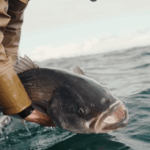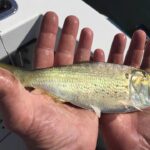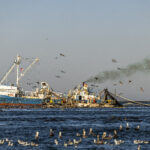
Release Mortality Revisited: New Research from Massachusetts DMF
Feature Photo Credit: Robbie Tartaglia What’s going on? For decades, striped bass management relied on a
Next to striped bass, the Policy Board’s discussion on albies and bonito was our top priority for this meeting. Since early February, ASGA strategized the best way to elevate these valuable inshore speedsters at the Commission. The plan we came up with was to subsidize two literature reviews on each species and then present and share them with the Commission. The idea being this would lessen the staff workload if the Policy Board wanted to move forward. You can read the letter ASGA submitted here, and the literature reviews are linked here: False Albacore and Atlantic Bonito.
In addition to striped bass, we had done a ton of outreach to state commissioners on albies and bonito. Our primary argument was “this is a great opportunity to be proactive and develop some precautionary guardrails that aren’t intended to overly burden any stakeholder.” It still boggles my mind that a species as economically important as false albacore, which provided over 800,000 fishing trips in 2022, has zero management.
Well, the discussion got off to a productive start. We heard several comments commending our efforts and willingness to contribute both data and resources to support our “ask.” That’s always been our goal—we put our money (quite literally in this scenario) where our mouth was, by funding the literature reviews to assist the Commission and catalyze management action as well as initiate two tagging programs. ASMFC Chairman Spud Woodward used those exact words and thanked ASGA for using this approach.
David Borden took the discussion to the next level, by recommending a technical committee or working group review the work MA DMF did for bonito (about half way through the document) and the ASGA-Nick Calabrese literature reviews to analyze the information and look into what management could look like. To us at ASGA, this seemed like a reasonable approach and would definitely keep the topic front of mind while not necessarily locking in any management (at that point).

We heard support for this approach from Connecticut’s Justin Davis, North Carolina’s Chris Batsavage, and MA’s Dan McKiernan, who first brought this idea of managing bonito to the Policy Board which then expanded to albies also. Unfortunately, the discussion took a turn. Borden’s idea was to move this through consensus, so as to not mandate anything, but allow the interested states to contribute some technical expertise and staff. However, it turned into a formal motion, and some states took hard opposition to the idea on procedural and objective points.
Some of the opposing arguments included “the Commission has more pressing issues than managing these species,” “the Commission can’t tell states what to do with their staff,” or our favorite, “these literature reviews aren’t peer reviewed.” The literature reviews we submitted collated all known scientific and fishery information known on these species, so to try to discredit the documents due to lack of peer-review doesn’t pass our logic tests. Additionally, that’s what Borden’s motion sought to accomplish: give the Commission and interested states the opportunity to provide technical analysis of these documents!
The final nail in this motion was Florida’s strong opposition to managing false albacore. Erika Burgess, the State’s Administrative Proxy, mentioned the state lands nearly half of all little tunny (aka false albacore) and has looked into false albacore several times, each time determining the species is not in need of conservation. Hmm, one state lands that high of a percentage of false albacore and doesn’t want to do anything proactive to consider possible management…we’ll leave it at that.
The Policy Board voted down the motion 14-2 with only Rhode Island and Connecticut in favor. While this is by no means the outcome we wanted, the issue is not dead because both RI and MA indicated that they are going to try and get together a working group to dig into the literature reviews and discuss what management could look like. We’re really looking forward to collaborating on providing input where we can. ASMFC staff and commissioners probably already realized this, but proactively developing some precautionary guardrails for albies and bonito is something we are entirely serious and devoted about. We look forward to continuing our science and research efforts later this fall, and we may even be looking into bonito too.
If you think albies or bonito are not in need of management, NY is currently looking at regulations on blowfish because harvest is through the roof. Our members can’t afford to lose another fish and neither can the tackle shops or other small businesses. Putting simple management in place is a heck of a lot easier than reactive, crisis management. Honestly, is that so hard to understand? While we appreciate the progress we’ve had with false albacore and Atlantic bonito (fishery managers have been talking about these species a lot more over the last year), we’ll continue asking managers to be proactive to develop some guardrails for these overlooked speedsters.

Feature Photo Credit: Robbie Tartaglia What’s going on? For decades, striped bass management relied on a

Recent developments in the 2025 Atlantic Menhaden Stock Assessment Update, released by the Atlantic States

What’s going on? The “most important fish in the sea” just exposed one of the

Mario CampoFisheries Ecologist, Southeastern Louisiana UniversityScience and Policy Associate, American Saltwater Guides Association This discussion
We rely on our members and donations to keep fighting for a sustainable tomorrow in marine conservation.
GIVE THE GIFT OF FISHERIES CONSERVATION THIS HOLIDAY SEASON. SHOP ASGA GOODS THAT FUND FISHERIES RESEARCH & ADVOCACY CAMPAIGNS
JOIN ASGA IN CALLING FOR CRITICAL MANAGEMENT ACTION AFTER YEARS OF SPAWN FAILURES & POOR MANAGEMENT.
By using this website, you agree to our use of cookies. We use cookies to provide you with a great experience and to help our website run effectively. To learn more, please review our privacy policy.
2 Responses
Sounds like some members of the Policy Board have an axe to grind with ASGA policies/positions. Damn!